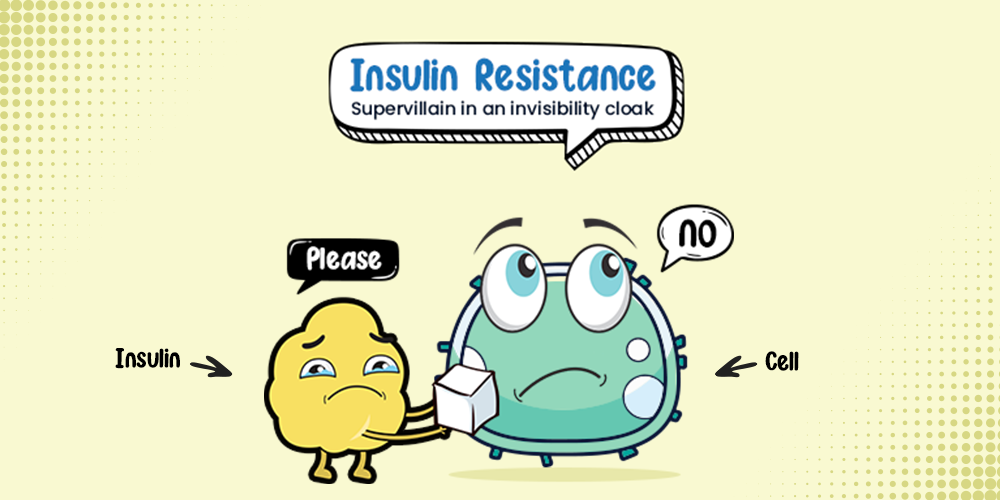Insulin resistance

What is insulin?
It is a hormone which is released from your pancreas and helps your body's cells absorb glucose and amino acids from the bloodstream. It helps assist with energy storage.

Insulin resistance
Your body's cells become less responsive to insulin. That does not seem too bad in the short term, but constant elevated levels of insulin have detrimental consequences for the health of your body.

Insulin will normally move glucose into fat cells and muscle cells, but since your cell receptors become less responsive to insulin, your pancreas churns out more insulin, leading to elevated levels of glucose and insulin.
Insulin resistance is the beginning of a very unhealthy metabolic process that may progress to metabolic syndrome or Type 2 Diabetes Mellitus.
Because the insulin is less effective at moving glucose into the cells, it causes unhealthy levels of glucose to circulate in the bloodstream. Glucose circulating in the bloodstream for too long can lead to irreparable damage to your organs and blood vessels.
Chronically elevated blood glucose levels damage the smaller blood vessels, which lead to cellular damage and various disease like cardiovascular disease, nerve problems, kidney, blindness, and poor wound healing.
Hormonal Disruption
Another problem is hormonal dysregulation due to chronically elevated insulin levels. It causes a negative butterfly effect on other hormones within your body.
Leptin resistance can cause people to overeat since this is a hormone which signals fullness.
Adiponectin is a hormone molecule which is involved with breaking down fat, so when there are chronically high insulin levels, it causes a down regulation in this molecule slowing down fat mobilization
High levels of circulating insulin disrupt cortisol regulation, leading to higher-than-normal cortisol levels. This perpetuates higher levels of glucose and impairs the ability of your body to respond effectively to stress.
Ghrelin is a hunger hormone. In insulin resistance, there is a dysregulation which may cause you to feel hungry all the time and over eat.
Sex hormones like estrogen can suffer from imbalances of high levels of insulin. A condition known as PCOS (Polycystic Ovarian Syndrome) can be associated with irregular periods and ovarian cyst negatively affecting quality of life.
Thyroid imbalances which may lead to hypothyroidism and symptoms such as constipation, fatigue, weakness, and weight gain.
Insulin resistance is also associated with melatonin dysregulation and insomnia.
What causes insulin resistance?
Genetics: If there is a family history of obesity or Diabetes this may mean it can predispose you to insulin resistance.
Obesity: Excessive body fat most notably around the abdomen and the organs releases substances which interfere with insulin function.
Physical inactivity: Lack of movement is a significant risk factor for insulin resistance. Exercise sensitizes your cells to insulin.
Poor dietary intake: Super refined sugars and carbohydrates are the major culprit to elevated bloods sugars. Chronic exposure results in higher and higher levels of insulin and insulin resistance.
Age: As we get older, our cells become less insulin sensitive, but this can be mitigated.
Chronic stress leads to chronically elevated cortisol levels, which causes insulin resistance.
How does one tell if you have insulin resistance?
I mentioned some hallmark signs above, but specific blood test and parameters can develop because of insulin resistance.
- High blood pressure
- High triglycerides
- Low HLD
- High fasting blood sugars
- Elevated fasting insulin levels
There is hope if you have insulin resistance. It becomes necessary to change your lifestyle. It is not enough to lose weight and diet for a short period. To successfully reverse insulin resistance, individuals need to adopt habits they can implement and maintain over a long period.
- Intermittent fasting or time restricted fasting is a proven strategy for sensitizing your cells to insulin as well as lowers blood sugar levels. It also reduces inflammation and promotes the release of hormones, which improves insulin sensitivity.
- Consistent quality sleep is absolutely pivotal in the role of normal insulin function. This is a nonnegotiable tool in your belt of health.
- Losing weight. Specifically targeting weight loss oriented to fat located around the organs and the abdomen. There is a difference between losing muscle weight and fat weight. The latter is most importance.
- Nutrition: Removing ultra processed carbohydrates and sugars while increasing protein intake, healthy fats and eating complex carbohydrates with a high glycemic index.
- It has proven exercise with resistance training to be one of the most effective ways of improving your insulin sensitivity. 3-4 sessions a week will improve your body's ability to regulate insulin. This method becomes even more effective if you can increase your muscle mass.
Summary
Insulin resistance does not develop right away. It may take years for your body to reach this state of unhealthy metabolism. There is no one factor but many which contribute to insulin resistance. Most of these factors we have control over time with the right habits and lifestyle over time to ensure we stay healthy.